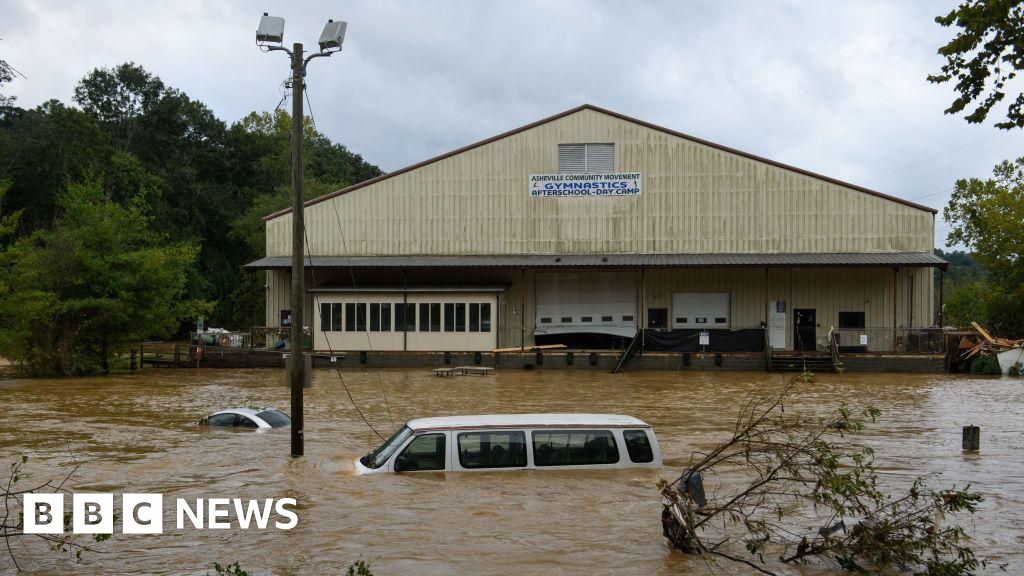On Monday, Mayor Patrick Fitzsimmons found himself at the epicentre of a disaster zone.
His town of Weaverville, North Carolina, had no electricity and no power. Only one grocery store was operational, utility poles had gone down, the town’s water plant had flooded and people had been without safe drinking water for four days, he told the BBC.
In the larger Buncombe County, where Weaverville is located, at least 35 people are dead and 600 are unaccounted for, a local CBS News affiliate reported.
Mr Fitzsimmons said the county set up a website where people can inquire about missing persons. Officials have so far received 11,000 requests.
Across the US south-east, millions of residents were thrown into chaos by storm Helene. It slammed into Florida as a category 4 hurricane on Thursday before barrelling across the states of Georgia, South Carolina, North Carolina and Tennessee, leaving flooding, power loss and death in its wake.
In the days since, the true scale of the destruction is coming into sharper relief as residents begin to return home to survey the damage.
At least 116 people have died nationwide, officials have said.
One of those people was Madison Shaw’s mother.
“Her last words to me were… ‘I love you, be safe. I’ll see you later,’” the resident of Anderson, South Carolina told CBS News. “And I said, ‘I love you. I’ll see you later as well.’”
“I can’t even describe it,” Ms Shaw told CBS News. “My mom was my best friend.”
A White House spokeswoman said on Monday that two million people are currently without power. President Joe Biden called the storm “history-making.”
Some of the most dire reports are coming from North Carolina, where the state’s governor Roy Cooper said that communities had been “wiped off the map” and that dozens of rescue teams had been deployed.
Buncombe County and the western corner of North Carolina endured some of the worst of Helene’s wrath.
The county includes Asheville, a city located in the Blue Ridge Mountains famed for its arts and music scene. Helene inundated the city with flood waters, drove people from their homes and left residents scrambling for basic resources. Trucks and trees smashed into buildings while downed power and telephone lines hung dangerously over the streets.
“Homes have been destroyed, flattened,” said 21-year-old Josh Griffith who lives just outside of Asheville in the town of Leicester.
“When it hit, we watched semi-trucks and storage crates and dumpsters and propane tanks floating down the river just rushing through parking lots, destroying everything in its path,” he told the BBC.
The apartment he shares with his fiancée sits high up on a hill and was safe from any serious damage. But on Saturday afternoon, by then without power or food, they decided to make their escape, taking rain-drenched roads out to north-east Georgia.
At one point, Mr Griffith and his partner were forced to drive straight through flood water, 6 inches deep of running water on top of 6 inches deep of mud. Emergency officials generally caution people against driving into flood waters of any depth during a storm.
“It was really scary,” he said. “Any time you’re driving over rushing water like that, there’s a fear your tires might slide out from underneath you.”
They made it out, stopping overnight in Georgia before driving back North Carolina, armed with food, water and supplies for their neighbours in Buncombe.
“People are just scrambling to get any resources they can,” he said.
Buncombe County officials opened four water distribution sites throughout the county on Monday.
Last week, before Helene arrived, 28-year-old Jesse Ross wondered whether the storm would be as destructive as some had forecasted.
“It turned out to be massive,” he said.
Mr Ross witnessed a “torrent of water” tear through his town of Waynesville, North Carolina, on Friday. The bridges were uncrossable. He couldn’t get in touch with anyone. His family is safe, he told the BBC, but they spent several days under a boil water advisory.
As residents begin to pick up the pieces, their futures remain uncertain.
Grayson Barnette, a lifelong resident who grew up in Lenoir, North Carolina, and now lives nearby, said a lot of the residents have spent their entire lives in these storm-ravaged communities.
“Some people are just poor and have lived in the same places for generations,” he said. “This was just unconscionable for a lot of people.”
Mr Barnette feared that residents’ deep ties to their communities may have led some to stay and weather the storm despite warnings.
“Entire communities have just been wiped off,” Mr Barnette said. “And people may or may not come back.”
Additional reporting by Holly Honderich and Carl Nasman.

